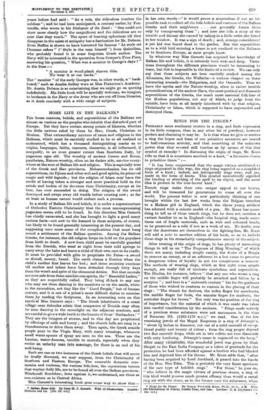HOME LIFE IN THE BALKANS.*
Tux home customs, beliefs, and superstitions of the Balkans are almost as various as the peoples who-inhabit that disturbed part of Europe. Yet they have certain strong points of likeness, whether the little nations ruled by them be Slav, Greek, Christian or Moslem. That extraordinary mixture of races and religions in the Balkans, which must be oarefully studied to be at all realized or anderstood, which has a thousand distinguishing marks sa to origins, languages, faiths, manners, character, is all influenced, if unequally, to an even greater extent than Southern Italy, by paganism ages old. The worship of ancient Greece and Rome, pantheism, Nature-worship, often on its darker side, survive every- where at the root of Balkan life and religion. This is especially true of the Greek and Slav provincea. Mohammedanism has its old superstitions, its Djinns and other evil and good spirits, its primeval magic and wild legends ; but the religion of Islam may have the credit of having taken a stronger and more praoticsl hold on the minds and bodies of its devotees than Christianity, except at its best, has ever succeeded in doing. The religion of the sword destroyed and swept away old worlds before creating new ; so far at least as human nature would endure such a process.
In a study of Balkan life and beliefs, it is under a superstructure of Orthodox Eastern Christianityat the most uncompromising, paganism seems still ,to be found. In this direotion Miss Garnett has chiefly excavated, and she has brought to light a good many curious facts—not new to the learned in these subjects, of course, but likely to be found generally interesting at the present day, and suggesting once snore some of the complications that must hang round a settlement of the Balkan question. Among the Balkan Greeks, for instance, the old religion keeps its hold on the populace from birth to death. A new-born child must be carefully guarded, from the Nereids, who steal at night from their cold springs to carry away the babe and leave a child of their own race in its cradle. It most be provided with gifts to propitiate the Fates—a sword or distaff, money, broad. The earth claims a libation when the child's mother first loaves her bed ; and these anxieties continue ! till mother and infant have been defended through forty days! from the wrath and spite of the elemental deities. Not that mortals are ever safe from these mischievous spirits, the " Beautiful Ladies," as they are respectfully called. They bring ill-luck to any one who may see them dancing in the meadows or on the sands, white in the moonshine, not tiny like the " Good People," but of human stature, and it is one of a priest's more difficult duties to exorcise them by reading the Scriptures. In an interesting note on this survival Miss Garnett says " The Greek inhabitants of a coast village near .Salonika relate that companies of Nereids may often be seen dancing in the moonlight on the adjacent seashore, and are careful to give a wide berth to the haunts of these Outlanders.' " They are the bringers of storms, and to this day are propitiated by offerings of milk and honey ; and the church bells are rung in a thunderstorm to drive them away. Then again, the Greek seaside people pray to the Virgin Mary, with many 'crossings, whenever small water-spouts of spray are seen on the sea. These are the Lamiae, water-demons, terrible to mortals, especially 'when they entice an unlucky man into marriage, for there is an end of his wellbeing.
Such are one or two instances of the Greek beliefs that will never be finally divorced, we may suppose, from the Christianity of Southern and Eastern Europe.. The venerable domestic cere- monies and customs, the curious folk-lore, the mysterious tenors that waylay daily life, are to be found all over the Balkan provinces. Witchcraft flourishes ; laws against it, we understand, are there as non-existent as in Central Africa.
Miss Garnett's interesting book goes some way to show that-
• lianas Have We. ny 3aey AL 2. Hammitt. With 10 Jllustratloms. London: Blethoeu sod Co. 110s. td. uet.)
in her ewn ,words—" it would prove a stupendous if not an im- possible task to collect all the folk-beliefs and customs of the Balkan Greeks and their neighbours . . . one generally barns thorn only by trausgreesing them " ; and here she tells a story of the trouble and dismay she caused by taking in a little owlet she found in her window. It was a sign of death ; and, strange coincidence! a pet kid was found dead in the garden. But this superstition as to a wild bird entering a house is not confined to the Balkans or to Southern Europe, as most people know.
In whatever way Mies Garnett has acquired her knowledge of Balkan life and beliefs, it is certainly both wide and deep. Varis- tions throughout the different provinces would be interesting to trace, but this is impossible in the limits of a review. We can only say that these subjects are here carefully studied among the Albanians, the Greeks, the Wallachs—a curious chapter on these interesting nomads—the Bulgarians, and the Osmanlis. Thus we have -the myths and the Nature-worship, often in rather terriblo personifications, of the ancient Slays, the snore poetical and domestic superstitions of the Greeks, the much more material folk-lore of the Moslem populations, not any of which, to judge from the outside, have been at all largely interfered with by that religion, Christianity or Islam, which is supposed to have superseded and destroyed them.














































 Previous page
Previous page